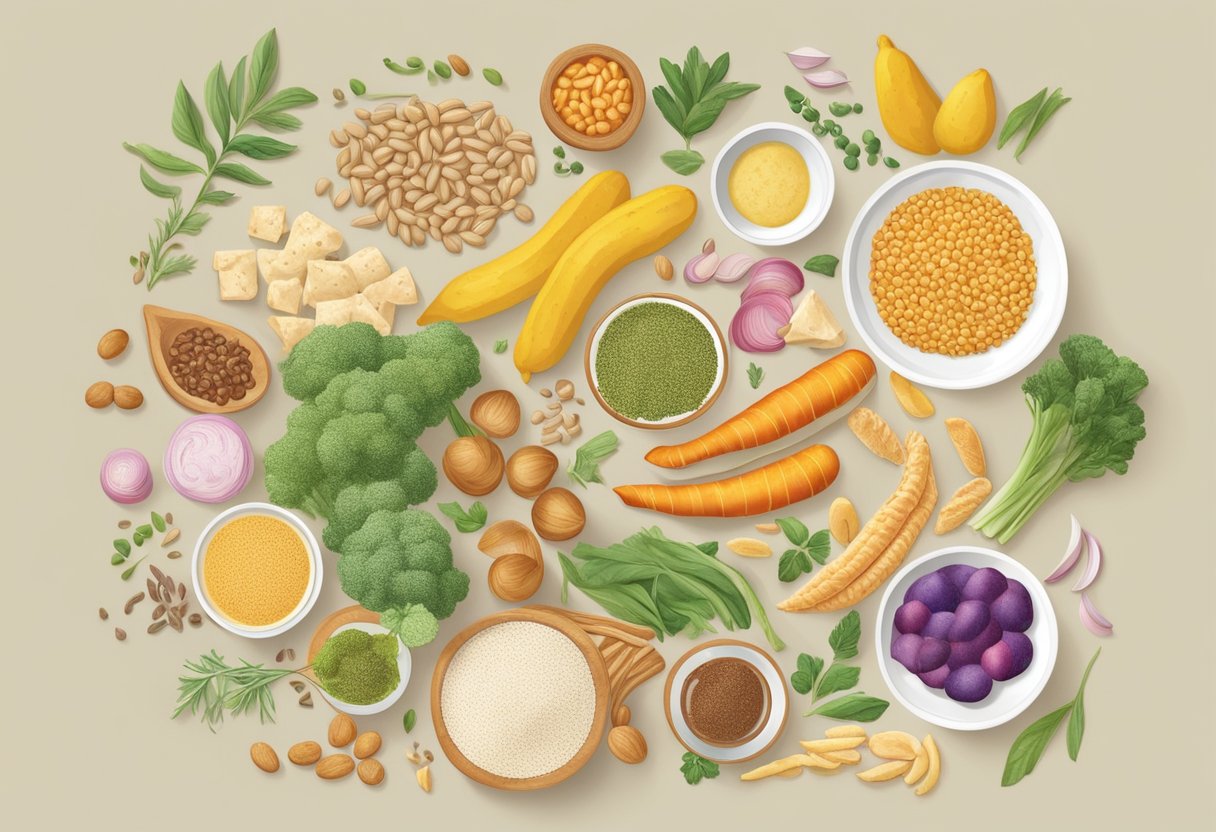Incorporating prebiotics and probiotics into a gluten-free Mediterranean diet can provide a symbiotic approach to digestive health and overall well-being. Those managing celiac disease or non-celiac gluten sensitivity often turn to a gluten-free diet to alleviate symptoms and promote intestinal healing. The Mediterranean diet, renowned for its health benefits, emphasizes the consumption of fruits, vegetables, legumes, and whole grains, many of which are naturally gluten-free. When combined, these diets can help replenish and maintain a balanced gut microbiota, crucial for a healthy digestive system.

Prebiotics are dietary fibers that feed the beneficial bacteria in the gut, while probiotics are the live bacteria that contribute to the intestinal flora’s balance. Including these elements in a gluten-free Mediterranean diet can enhance nutrient absorption, strengthen the immune system, and reduce inflammation. It’s not only about removing gluten from the diet but also about ensuring that what is included supports overall health, particularly the gut’s complex ecosystem.
Key Takeaways
- A gluten-free Mediterranean diet enhanced with prebiotics and probiotics supports digestive health.
- This dietary approach can aid in nutrient absorption and help manage celiac disease and gluten sensitivity.
- Including these components may reduce inflammation and improve the balance of the gut microbiota.
Table of Contents
Understanding Celiac Disease and Gluten Sensitivity

The link between celiac disease, gluten sensitivity, and dietary intervention is a critical area of consideration for those looking to adopt a gluten-free Mediterranean diet. Understanding the physiological mechanisms and symptoms can guide effective dietary choices.
Pathophysiology of Celiac Disease
Celiac disease is an autoimmune disorder where the ingestion of gluten leads to damage in the small intestine. It affects individuals who are genetically predisposed and can cause serious intestinal and systemic symptoms. The presence of gluten prompts an inflammatory immune response which compromises the intestinal barrier, leading to a cascade of immune reactions that can damage intestinal villi.
Non-Celiac Gluten Sensitivity Challenges
Non-celiac gluten sensitivity (NCGS) presents a different set of challenges as it lacks the autoimmune component seen in celiac disease. Individuals with NCGS experience symptoms similar to celiac disease when consuming gluten, but without the associated intestinal damage. Diagnosis is challenging due to the absence of specific biomarkers. Management of NCGS involves adhering to a strict gluten-free diet to alleviate symptoms.
Fundamentals of the Mediterranean Diet
The Mediterranean Diet is revered for its symbiotic relationship with health, emphasizing the consumption of olive oil, nuts, and a bounty of plant-based foods. It is a dietary framework that aligns with the pursuit of well-being.
Core Components of the Mediterranean Diet
Olive Oil: The cornerstone fat source of this diet, olive oil is not only central to flavor but also boasts a wealth of healthful antioxidants and monounsaturated fats.
Nuts and Seeds: Including a variety of nuts and seeds is encouraged, as they provide essential fats, fibers, and proteins that are important for a wholesome gluten-free option.
Legumes: Legumes are a foundational protein source, rich in fibers and key nutrients.
Whole Grains: In a gluten-free Mediterranean diet, whole grains like quinoa and buckwheat are integral for their nutrient profile and fiber content.
Fruits and Vegetables: With an emphasis on freshness, fruits and vegetables are consumed in abundance, contributing fibers, vitamins, and antioxidants to the diet.
Fish and Seafood: They are preferred protein options, providing essential omega-3 fatty acids beneficial for heart health.
Oligosaccharides: Found in many plant-based foods included in this diet, oligosaccharides act as prebiotics, supporting gut health.
Health Benefits
The Mediterranean Diet is linked to a multitude of health benefits, reinforced by the presence of fibers, antioxidants, and healthy fats. These components are key in promoting heart health, supporting weight maintenance, and reducing the risk of chronic diseases. It’s particularly known for its potential to improve gut health through a rich variety of prebiotic foods that nourish beneficial gut bacteria.
Gluten-Free Mediterranean Diet Composition
The Gluten-Free Mediterranean Diet combines traditional Mediterranian food staples with the necessary adjustments for a gluten-free lifestyle.
Adapting Mediterranean Staples
The traditional Mediterranean diet is replete with fruits, vegetables, legumes, and healthy fats like olive oil. For someone on a gluten-free diet, it is crucial to adapt this pattern by substituting gluten-containing foods with gluten-free alternatives. Seafood and poultry remain staple proteins, while sweets and red meats are limited.
Alternative Grains and Gluten-Free Options
Gluten-free grains are fundamental in adapting the Mediterranean diet for those with celiac disease or gluten sensitivity. Oats are a versatile option, but they must be certified gluten-free to prevent cross-contamination. Rice, including whole-grain brown, black, or red rice, and corn are also safe grain alternatives. These grains can be used in a variety of dishes, from pilafs to salads, maintaining the diet’s focus on whole foods.
Prebiotics and Probiotics in Diet
The gluten-free Mediterranean diet emphasizes the importance of both prebiotics and probiotics to support a healthy intestinal microbiota. Understanding their roles and sources within this dietary context provides a foundation for optimal gut health.
Role of Prebiotics
Prebiotics are indigestible fibers that act as fuel for beneficial bacteria, including Bifidobacterium and Lactobacilli, in the gut. On a gluten-free Mediterranean diet, foods such as fruits, vegetables, and legumes contribute to this need without including gluten-containing grains. These fibers help to maintain a robust and balanced gut microbiota by promoting the proliferation of health-enhancing bacteria.
Role of Probiotics
Probiotics are live, beneficial microorganisms that, when ingested in adequate amounts, confer a health benefit on the host. The gluten-free Mediterranean diet incorporates probiotics through fermented foods such as dairy-free yogurt and kefir, which are rich in lactobacilli and bifidobacterium, known to enhance gut health. Probiotics directly contribute to the diversity and functionality of the microbial community within the intestinal tract.
Sources and Dietary Incorporation
Incorporation of prebiotics and probiotics into a gluten-free Mediterranean diet involves mindful selection of food sources. Prebiotic-rich foods suitable for this diet include:
- Bananas
- Garlic
- Onions
- Soybeans
To add probiotics, one might include:
- Yogurt (dairy-free options)
- Kefir
- Sauerkraut
- Kimchi
By routinely integrating these food items into meals, individuals can support their microbiota and thus, promote a healthier digestive system.
Nutritional Considerations and Supplementation
When adopting a gluten-free Mediterranean diet, one must be vigilant to maintain balanced nutrition, ensuring adequate intake of essential nutrients, which can sometimes be challenging in the absence of gluten-containing grains.
Managing Nutritional Deficiencies
The gluten-free Mediterranean diet emphasizes fruits, vegetables, lean proteins, and healthy fats, all while avoiding gluten. Individuals must be conscientious about the risk of nutritional deficiencies. This diet is rich in vitamins and minerals, but some may be at risk of low levels of certain B vitamins found in whole grains. To combat this, they should focus on gluten-free whole grains like quinoa and brown rice, which can provide similar nutrients. Regular monitoring of one’s nutritional status, including the levels of vitamins and amino acids, is crucial to ensure that all dietary needs are met.
Supplements and Fortified Foods
Incorporating dietary supplements and fortified foods can help address potential nutrient gaps in a gluten-free Mediterranean diet. For example, B vitamin supplements or foods fortified with these vitamins can help make up for the absence of traditional, gluten-containing grains. Calcium and vitamin D are also important, and one may benefit from fortified plant-based milks or supplements, especially if dairy consumption is low. Specific probiotics that are labeled gluten-free can support gut health, which can be found in yogurt and kefir. Additionally, a focus on omega-3 fatty acids through supplements like fish oil can support heart health consistent with the principles of a Mediterranean diet.
Digestive Health and Microbiome

The incorporation of prebiotics and probiotics into a gluten-free Mediterranean diet can play a pivotal role in optimizing digestive health by maintaining a balanced and diverse gut microbiome.
Intestinal Microbiota and Permeability
The intestinal microbiota is a complex ecosystem of bacteria, fungi, and viruses living in the gastrointestinal tract. When following a gluten-free Mediterranean diet, which is rich in fibers and fermentable oligosaccharides, beneficial bacteria such as Akkermansia and Verrucomicrobia can thrive. These bacteria are integral in maintaining intestinal permeability, preventing unwanted substances from entering the bloodstream, a factor often compromised in conditions like celiac disease.
Microbiome Balance and Dysbiosis
Microbiome balance is crucial for digestive health, with dysbiosis—an imbalance where harmful bacteria like Proteobacteria, Clostridium, and Enterococcus overshadow beneficial ones—being a common issue. A gluten-free Mediterranean diet naturally includes synbiotics—combinations of fibers and probiotics—which help foster bacterial diversity. Foods like inulin, found in garlic and onions, support the growth of health-promoting bacteria, preventing dysbiosis and promoting overall intestinal health.
Inflammatory Responses and Gut Health

Inflammatory responses within the gastrointestinal tract can be significantly influenced by diet, particularly through the incorporation of probiotics and prebiotics. Managing inflammation is crucial for conditions like inflammatory bowel disease and for overall gut health.
Reducing Inflammation Through Diet
Modifying one’s diet, especially adopting a gluten-free Mediterranean diet, is known for its potential to reduce systemic inflammation and improve gut health. This diet is rich in vegetables, fruits, nuts, seeds, and legumes, along with ample amounts of olive oil, which provide antioxidants and polyphenols. These components have been linked to a reduced inflammatory response within the gut. Additionally, the exclusion of gluten can decrease gastrointestinal upset in those with gluten sensitivities, further contributing to an anti-inflammatory state.
Probiotics, Prebiotics, and Inflammation
The introduction of probiotics and prebiotics into the diet is associated with improved gut health by enhancing the gut microbiome. Probiotics, the live beneficial bacteria, contribute to the maintenance of a healthy intestinal lining, thus reducing intestinal permeability. Prebiotics, which are fibers that the human body cannot digest, serve as food for these beneficial bacteria. The combination of both promotes the production of short-chain fatty acids (SCFAs), which have been found to regulate inflammation and immune responses by affecting cytokine production. Regular consumption of prebiotic and probiotic-rich foods, such as yogurt, kefir, and fibrous fruits and vegetables, supports the gut microbiome’s role in taming the gut’s inflammatory processes.
Dietary Approaches to Weight Management
The integration of prebiotics and probiotics into a gluten-free Mediterranean diet presents a tailored approach to weight management, leveraging dietary adjustments to combat obesity.
Mediterranean Diet for Weight Loss
The Mediterranean diet is renowned for its rich variety of plant-based foods, lean proteins, and healthy fats. Studies have shown that this diet can be an effective strategy for weight loss because of its emphasis on whole grains, fruits, vegetables, legumes, and nuts. It prioritizes olive oil as the primary source of monounsaturated fat, which can help reduce the risk of heart disease. The Mediterranean diet’s high content of fiber and healthy fats aids in creating a feeling of fullness, which can reduce overall calorie intake and support sustained weight loss.
Impact of Gluten-free on Weight Management
Adopting a gluten-free diet as part of the Mediterranean lifestyle may be beneficial for weight management, particularly for individuals with gluten sensitivity or celiac disease. Removing gluten-containing products and focusing on naturally gluten-free foods like rice, quinoa, and potatoes can help prevent inflammation and digestive issues that might otherwise impede weight loss efforts. Moreover, a gluten-free Mediterranean diet encourages mindful eating and the consumption of unprocessed, nutrient-dense foods, which is crucial in maintaining a healthy weight.
Special Considerations for Specific Groups

When following a gluten-free Mediterranean diet, it is essential to consider how the incorporation of prebiotics and probiotics may be adjusted for those with specific dietary needs, such as vegetarians, vegans, and individuals with food intolerances or allergies.
Customizing for Vegetarian and Vegan Needs
For vegetarians and vegans adhering to a gluten-free Mediterranean diet, it is crucial to ensure that all probiotics and prebiotics are derived from plant-based sources. Ensuring a variety of fresh produce, like asparagus, artichokes, and onions, can contribute to the adequate intake of prebiotics. Vegetarians may include dairy products like yogurt which contain probiotics; however, vegans will need dairy-free alternatives that have been fortified with probiotics, such as certain almond or soy yogurts.
Addressing Intolerances and Allergies
Individuals with intolerances or allergies, such as lactose intolerance, must be attentive to the types of probiotics and prebiotics they incorporate into their gluten-free Mediterranean diet. They should opt for lactose-free products that still provide the necessary probiotic strains, such as Bifidobacterium and Lactobacilli. For those allergic to dairy, they can find probiotics in fermented foods like sauerkraut and kombucha. As for prebiotics, they are primarily found in a variety of plant-based foods and should be included with consideration to any specific produce allergies.
Planning Meals and Recipes

When integrating prebiotics and probiotics into a Gluten-Free Mediterranean Diet, meal planning revolves around whole, nutrient-dense foods. This approach ensures a balanced intake of fiber-rich fruits and vegetables, lean proteins, and fermented foods that are hallmarks of the diet.
Breakfast Options
For breakfast, individuals can start their day with a yogurt parfait featuring Greek yogurt, rich in probiotics, layered with mixed berries and a sprinkle of gluten-free granola for crunch. Another option is a smoothie bowl that includes a blend of kefir, a probiotic-rich fermented milk drink, with banana, spinach, and gluten-free oats, topped with chia seeds for added fiber.
Lunch and Dinner Recipes
Lunches and dinners should include a variety of vegetables, lean proteins, and gluten-free grains. A typical lunch might consist of a quinoa salad with roasted red peppers, cucumbers, kalamata olives, and feta cheese, drizzled with olive oil and lemon juice. Dinner could feature baked salmon with a side of sautéed kale and quinoa, both providing prebiotic fibers to support gut health.
Snacks and Refreshments
When it comes to snacks and refreshments, options like carrot sticks with hummus or a piece of fruit with a handful of nuts offer both prebiotic fibers and healthy fats. Refreshments could include green tea or kombucha, a fermented tea that contains naturally occurring probiotics, both complementing the gluten-free Mediterranean diet.
Long-term Health and Chronic Disease Prevention
Chronic diseases such as cancer, obesity, inflammatory bowel disease, and irritable bowel syndrome have multifactorial causes, but diet plays a pivotal role in both development and prevention. A gluten-free Mediterranean diet, enhanced with prebiotics and probiotics, offers potential benefits for long-term health and disease prevention.
Role of Diet in Chronic Diseases
Chronic diseases—conditions that persist for long periods—are influenced significantly by dietary patterns. Cancer, often characterized by uncontrolled cell growth, has been linked to diets high in processed foods and low in nutrients. Obesity, a global epidemic, is, at its core, an energy balance issue but can be exacerbated by a diet high in calories and poor in nutrient density. The incidence of gastrointestinal disorders, including inflammatory bowel disease (IBD) and irritable bowel syndrome (IBS), is also rising, with diet playing an important contributory role.
A gluten-free Mediterranean diet focuses on the consumption of whole, nutrient-dense foods, such as fruits, vegetables, nuts, seeds, and lean proteins, while avoiding processed foods and gluten-containing grains. This diet profile not only supports weight management but also reduces the risk of chronic inflammation, a common denominator in many chronic diseases.
Probiotics, Prebiotics, and Long-Term Health
The inclusion of probiotics and prebiotics in a diet is essential for gut health, which in turn is critical for overall long-term health. Probiotics are live microorganisms that, when consumed in adequate amounts, confer a health benefit on the host. They can be found in fermented foods like yogurt and kefir, which easily complement a Mediterranean dietary pattern.
Prebiotics, on the other hand, are non-digestible food components that selectively stimulate the growth or activity of beneficial bacteria in the colon. Foods rich in prebiotics include garlic, onions, and bananas, which align well with dishes commonly found in a Mediterranean diet.
Regular consumption of these functional foods within a gluten-free Mediterranean diet framework can help maintain the balance and diversity of gut microbiota. This, in turn, has been observed to play a role in the prevention and management of chronic diseases, potentially reducing the risk of conditions such as IBD, IBS, obesity, and even certain forms of cancer. The gut microbiome influences the development of chronic diseases, and nurturing a healthy gut environment with probiotics and prebiotics can help mitigate these diseases.
Lifestyle Integration and Practical Tips

Integrating a gluten-free Mediterranean diet, rich in prebiotics and probiotics, into one’s lifestyle involves mindful adoption and vigilance to ensure the diet’s effectiveness and to prevent cross-contamination.
Implementing the Diet in Everyday Life
When they first adopt a gluten-free Mediterranean diet, individuals should focus on naturally gluten-free foods that are staples in Mediterranean cuisine, such as fruits, vegetables, legumes, and healthy fats like olive oil. Consistently including probiotic-rich foods such as kefir or lactose-free yogurt can assist with maintaining a healthy gut, which is particularly advantageous for those with gluten sensitivities or celiac disease. They should also integrate prebiotic foods like garlic, onions, and bananas that fuel beneficial gut bacteria.
It’s essential for individuals to plan their meals in advance and be educated about the gluten content in whole grains. Those on this diet should opt for quinoa, buckwheat, and millet which are nourishing gluten-free grains. Additionally, to alleviate constipation, a common issue when starting a gluten-free regimen, they must ensure adequate dietary fiber intake, often through nuts, seeds, and leafy greens.
Avoiding Cross-Contamination in a Gluten-Free Diet
To effectively prevent gluten cross-contamination, individuals must be prudent in both food preparation and when selecting food products. They should:
- Use separate cooking and preparation areas, utensils, and storage containers for gluten-free foods.
- Be vigilant when reading product labels and opt for items that are certified gluten-free to avoid accidental ingestion of gluten.
- Be cautious when eating out by communicating their dietary needs clearly to restaurant staff and verifying that the meal options are free from gluten.
When it comes to lifestyle, individuals must be proactive in educating themselves and those around them about the intricacies of a gluten-free diet and the risks of cross-contamination, as even the smallest amount of gluten can be harmful to those with celiac disease or gluten intolerance.
Global and Cultural Perspectives

The incorporation of prebiotics and probiotics into a gluten-free Mediterranean diet reflects diverse cultural adaptations and a growing global emphasis on gut health.
Mediterranean Diet in Different Cultures
In Italy, the Mediterranean diet is characterized by high consumption of fruits, vegetables, legumes, and whole grains, with olive oil serving as the primary source of fat. A significant component of this diet is its gluten-based grains such as wheat. However, with the prevalence of celiac disease and non-celiac gluten sensitivity, Italian cuisine has seen a noteworthy transformation. Artisanal producers and chefs have begun to incorporate gluten-free grains like quinoa and gluten-free blends that allow for traditional foods, such as pasta, to be enjoyed by those on a gluten-free diet. Ancient grains that are naturally gluten-free, such as amaranth and millet, are also gaining popularity.
Adaptation of Prebiotics and Probiotics Globally
On a global scale, the adoption of prebiotics and probiotics aligns with the health-promoting principles of the Mediterranean diet. Probiotic foods such as yogurt and kefir are consumed for their beneficial bacteria, which can be integral for maintaining gut health, especially for individuals on a gluten-free diet. Furthermore, prebiotic-rich foods, like garlic, onions, and asparagus, feed the beneficial gut flora, supporting digestive health. These elements are adopted into diets worldwide to enhance gut microbiota composition, often with the inclusion of probiotic supplements that have been reported to support gut health in clinical studies.
Future Directions and Research

Exploring the intricate relationship between diet, gut health, and overall well-being remains a dynamic area of scientific inquiry. Particularly, the interaction of prebiotics and probiotics within a gluten-free Mediterranean diet opens new avenues for managing digestive health and autoimmune conditions like celiac disease (CD).
Emerging Research on Microbiota and Diet
Researchers are continuously uncovering how dietary components influence the gut microbiota, with a growing focus on the relationship between gluten-free diets and the composition of gut bacteria, including Firmicutes and Bacteroidetes. Studies aim to determine how variations in dietary patterns, such as the inclusion of prebiotics like non-digestible fibers, can promote the growth of beneficial bacteria including Bifidobacterium infantis and Lactobacillus acidophilus. In the context of a gluten-free Mediterranean diet, which traditionally comprises high amounts of fruits, vegetables, and legumes, the potential for these prebiotics to foster a healthy microbiota is significant.
Emerging research suggests that the balance between different gut bacteria such as Bacteroides may play a role in immune activation and antibody production. This balance may be critical for individuals with CD, as gluten-containing foods from wheat, rye, and barley are excluded, potentially leading to nutritional imbalances if not carefully managed.
Innovation in Gluten-Free and Probiotic Foods
Innovation in the development of gluten-free and probiotic-enriched foods is a key area of focus. The aim is to provide tasty and healthful alternatives without compromising on nutritional value. One example is the research on a specific strain of bacteria, B. breve B632, which has been studied for its potential to degrade gluten peptides that may otherwise stimulate adverse immune responses in individuals with CD.
The development of new gluten-free products that integrate strains like B. breve B632 alongside other probiotics such as Lactobacillus acidophilus offers promise for more comprehensive dietary strategies. These foods are designed to not only provide safe options for those with CD but also to enhance the overall health of the gut microbiota, potentially reducing gluten-related gastrointestinal symptoms.
Both sectors of research are crucial for the refinement of a gluten-free Mediterranean diet that adequately supports the microbiota, providing insights for dietary recommendations and the formulation of probiotic supplements that may aid in immune regulation and digestive health.
Frequently Asked Questions
In a gluten-free Mediterranean diet, prebiotics and probiotics play a significant role in maintaining gut health. These FAQs explore how to incorporate these beneficial elements into the diet, suitable gluten-free flour options, and the effects on nutritional value.
How can prebiotics and probiotics be incorporated into a gluten-free Mediterranean diet?
One can incorporate prebiotics into a gluten-free Mediterranean diet by consuming high-fiber fruits, vegetables, and legumes such as onions, garlic, and chickpeas. For probiotics, incorporating fermented foods like gluten-free yogurt and kombucha can support gut health.
What are the gluten-free flour alternatives suitable for someone following a Mediterranean diet?
Individuals on this diet can use gluten-free flours like almond, coconut, or chickpea flour, which are not only in line with Mediterranean diet principles but also provide additional nutrients and fiber.
Which probiotic-rich foods align with the Mediterranean diet principles and are safe for gluten-sensitive individuals?
Probiotic-rich foods that fit a Mediterranean diet include gluten-free yogurt, kefir, and aged cheeses, along with fermented olives and pickles, ensuring they are labeled gluten-free to avoid cross-contamination.
What modifications can be made to the Mediterranean diet to meet the needs of someone with gluten intolerance?
To adapt the Mediterranean diet for gluten intolerance, one must eliminate gluten-containing grains and replace them with gluten-free alternatives such as quinoa and brown rice. Emphasis should be on naturally gluten-free Mediterranean staples like fruits, vegetables, nuts, seeds, legumes, fish, and olive oil.
How does the inclusion of prebiotics and probiotics impact the nutritional value of a gluten-free Mediterranean diet?
The inclusion of prebiotics and probiotics can enhance the nutritional profile of the diet by promoting a healthy gut microbiome, which is crucial for nutrient absorption, digestion, and overall health.
Are there gluten-free Mediterranean diet options that support good gut health through prebiotics and probiotics?
Yes, there are many gluten-free options within the Mediterranean diet that support gut health, such as gluten-free grains that act as prebiotics and fermented foods as probiotic sources. These can be seamlessly integrated into meals and snacks throughout the day.



